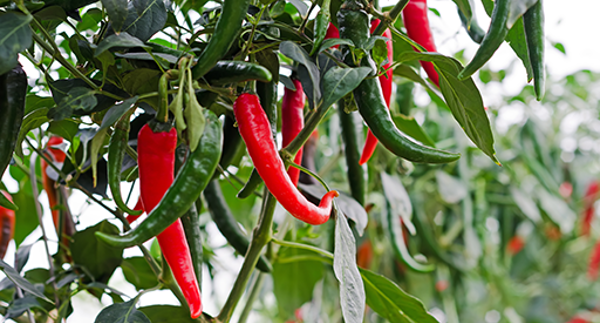
5 Steps to Chilli Planting Success
- Choose a warm, sunny spot. Spring and summer are the best times to plant chillies in New Zealand.
- Prepare your soil with organic matter like compost and sheep pellets.
- Add a layer of vegetable mix to plant into.
- Feed your chillies regularly and keep the soil moist throughout the growing season.
- Stake taller plants and those grown in wind-prone areas.
Follow our full guide below to a bumper crop of homegrown chillies.
Chillies are popular as they are a relatively quick to produce crop. Chillies don’t need a lot of special care and come in a rainbow of attractive colours. Chillies degree of hotness varies greatly from the very mild, quite easy to eat types, through to the fire-breathing habanero blends.
Prepare
In addition to planting in garden beds, chillies are perfect for a pot, basket, window box, and ideal for small plots or for gardeners with little time or space. Chillies need heat and sun to flourish. Be aware that they are frost-tender, so in cold areas don’t think about planting them outdoors until November. This isn’t too late, as they only take three months to mature and will produce fresh chillies for months when they are regularly harvested.
Popular chilli varieties include: Anaheim, Cayenne, Habanero (red or mix), Jalapeno, Serrano and Wildfire.
Check out our Tui Chilli Seed - Cayenne Anmol for compact plants that produce large yields.
Refer to our Planting Calendar for when to plant and harvest chillies in your region.
If sowing from seed, chilli seeds are best raised under glass or indoors in spring, as it needs a high temperature to germinate. Sow in trays in spring and summer. Once the seedlings are at least 5cm tall, prick out into pots or transplant into the garden.
Plant
Like building a house a good foundation is the key to success in your garden. The better the soil, the better your plants will grow. Chillies prefer a rich, fertile soil. If you are starting with an existing garden bed dig in organic matter like Tui Sheep Pellets and Tui Compost to your soil. Then you can add a layer of Tui Vegetable Mix. If planting in pots and containers, fill with Tui Vegetable Mix.
The best times to plant are early in the morning or late in the day, so the plants aren’t exposed to the hot sun straight away. Always water plants well before and after planting.
Planting in garden beds
How far to plant your chillies apart in rows depends on the variety, but on average 30cm seems to work for most types.
- Water plants thoroughly before planting and allow to drain.
- Dig a hole, approximately twice the depth and width of the root ball of your plant.
- Partly fill the hole with Tui Vegetable Mix.
- Gently loosen the root ball of your plant and position the plant in the centre of the hole.
- Fill in with Tui Vegetable Mix.
- Press soil gently around the base of the plant.
- Water your plant well.
Planting in pots and containers
Chillies don't require a lot of root room, and as long as the soil is 20cm deep they should flourish.
- Water plants thoroughly before potting and allow to drain.
- Partly fill your container with Tui Vegetable Mix.
- Gently loosen the root ball of your plant and position the plant in the container.
- Fill your container with Tui Vegetable Mix up to 3cm from the top.
- Tap the container gently on the ground to settle the mix.
- Press soil gently around the base of the plant.
- Water your plant well.
Nourish
Feed your plants and they will feed you. Plants use nutrients from the soil as they grow, so replenishing the nutrients ensures your plants grow to their full potential.
Select a fertiliser specially blended for your crop like Tui Vegetable Food. Feed chillies planted in containers with Tui NovaTec® Premium fertiliser. Keep the soil moist throughout the growing season.
For supercharged feeding with quick visible results try Tui Vege & Herb Liquid Superfood.
While your chillies are growing regularly apply a dose of Tui Organic Seaweed Plant Tonic to give them a welcome boost.
Well watered, well nourished chillies will have a better chance of keeping insect pests and diseases at bay.
Harvesting
Chillies take approximately three months to mature. Cut chillies off the plants when they are ready - don't pull them from the plant as often they will rip. The colour and flavour changes as the crop matures. Chillies store well in the fridge or a dry, dark cupboard.
Staking may be required for taller plants, or those grown in windy areas.
Be vigilant and stop unwanted insects and diseases from ruining your plants. Slugs and snails can be an issue - lay Tui Quash slug and snail control around young plants.